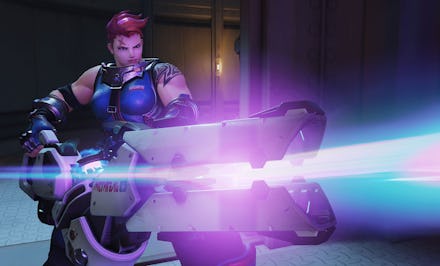Kim “Geguri” Se-yeon just became the first woman to join the professional ‘Overwatch’ League

The official professional league for Blizzard’s colorful, amazingly popular multiplayer shooter Overwatch just found its very first female player in South Korean 19-year-old Kim “Geguri” Se-yeon.
Geguri — who is most known for playing the pink-haired, Russian body-builder character Zarya — has joined the Shanghai Dragons while the Overwatch League is on a temporary hiatus. Until April 3, the League’s 12 teams are free to make trades and recruit new players to their rosters in the hopes of boosting their performance before the playoffs later in the year. For the Dragons, who have struggled in the League thus far, Geguri and the other three players who will join alongside her represent a chance to turn things around.
Geguri first made headlines in June 2016 after a group of other Overwatch players accused her of cheating, threatening violence against her in the process. She proved them wrong by playing the game on-camera. Her accusers quit the Overwatch scene as a result. Then, in August 2017, Geguri became the first woman to play in the now-defunct Overwatch Apex tournament for the South Korean ROX Orcas team.
The League, which is still in its inaugural season, has been going through some growing pains when it comes to reconciling the game’s inclusive themes with the exclusivity of esports in general. NRG Esports — which owns the San Francisco Shock — touted the diversity of its team, but didn’t invite any women to try out. When the Houston Outlaws were asked why it hadn’t signed Geguri, its manager and a few of its players expressed trepidation for a number of reasons. Their remarks acknowledged that the lack of women in the Overwatch League was a problem, but it seemed like nobody was willing to take the first step toward rectifying the issue, according to Kotaku.
To make matters more complicated, Geguri herself has reportedly resisted praise for being Overwatch’s most visible female player. In the wake of her triumph over the aforementioned cheating accusations in 2016, she said she didn’t “want people to use [her] story as a way to forward their own ideologies,” according to ESPN.
Regardless of how Geguri feels about it personally, her accomplishment is notable for the landscape of professional Overwatch — and for esports more generally, which historically has been a male-dominated space. As a game, Overwatch is twice as popular among women than typical first-person shooters, yet women were entirely absent from Blizzard’s own professional league. There’s still a lot of work to be done to make esports more inclusive, but this is certainly an important step.